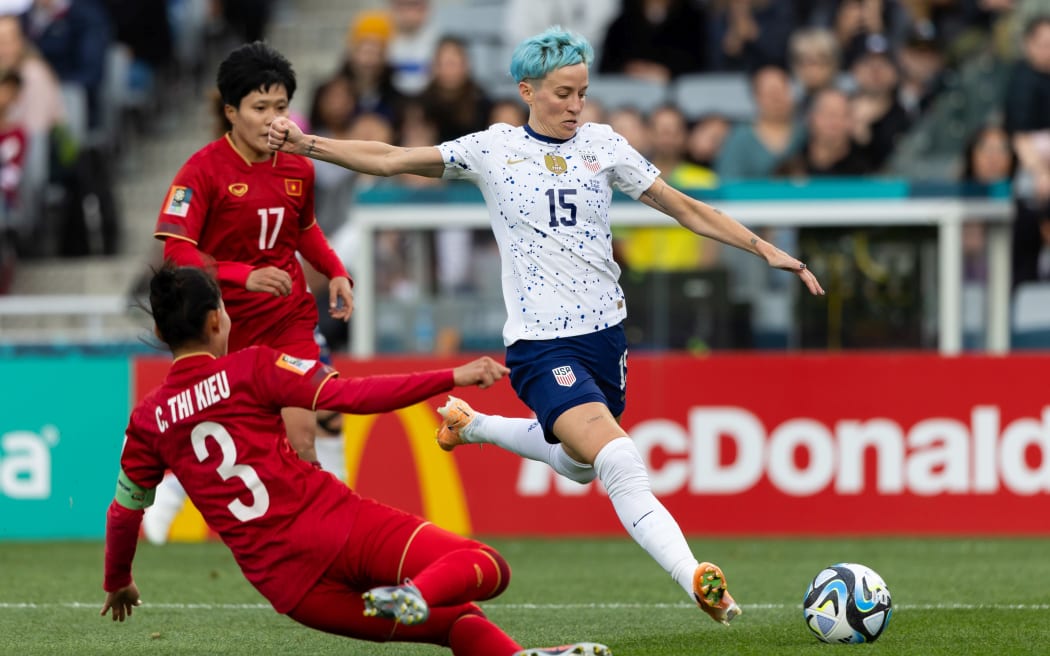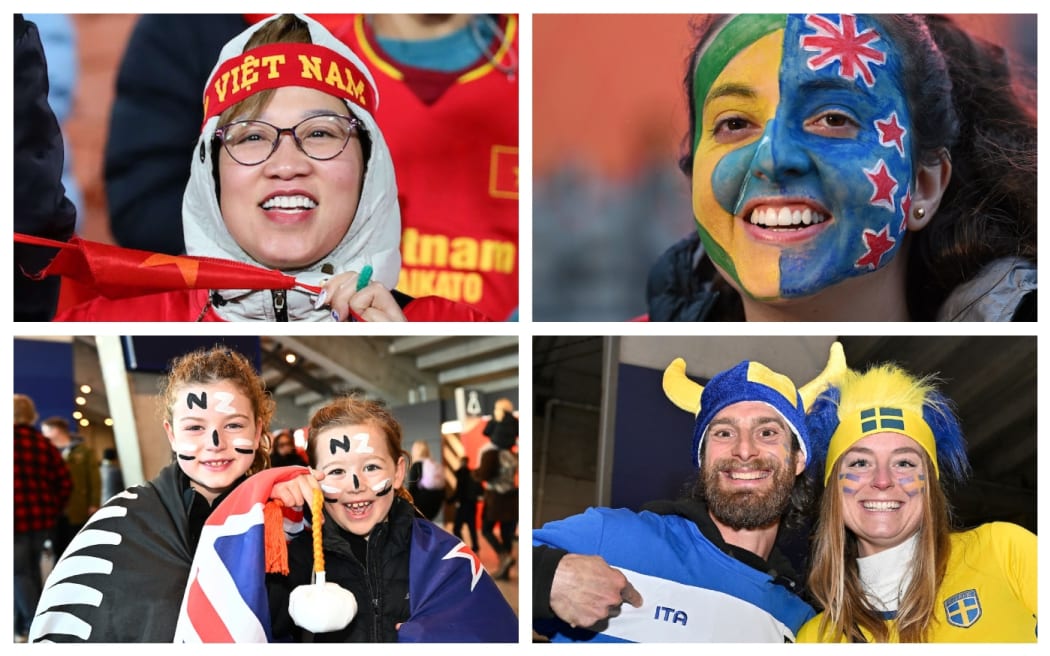
United States forward Megan Rapinoe in action against Vietnam during -the FIFA World Cup match at Eden Park. Photo: Photosport
The sheer scale of the FIFA Women's World Cup 2023 presents opportunities on several levels, particularly in driving messages of sustainability and inclusion.
In this episode of Voices, FIFA WWC 2023 Head of Sustainability joins Kadambari Raghukumar to talk about what those look like when it comes to sport, and why they've become an increasing focus with FIFA.
US-born Sheila Nguyen started her sport journey as a 10-year-old in love with the 'beautiful game', forging her dad's signature to get into training. Her family arrived in the US as former refugees from Vietnam and when it came to Sheila's upbringing, veering from academics and piano into sport was near impossible.
This year's FIFA World Cup will see more than 1.5 million attendees across New Zealand and Australia, with millions more watching the matches online.
The scale of the event presents opportunities beyond the game from a sustainability perspective.
Nguyen says it's a very interesting time right now.
"It is transitioning, you know the terms are transitioning, the way we think about ourselves and the world is transitioning - but also the dots are connecting. And that to me is really exciting, so that is a really foundational piece of this is that environmental health means the health of us and our wellbeing."
Since the FIFA World Cup 2014 in Brazil idea of football and sustainability has taken mainstage with the organisation.
Football and other sports have their own eco-systems whose impacts go way beyond just the match to affect social, environmental and human rights issues.
'I actually forged my parent's signature to play football'
Nguyen says even though she's not playing football now, when she was younger she was very good and on a "junior professional pathway".
"Football changed my life," she says.
"It got me outside, I was obese at the time of course and I had this sticker in my room that said 'I'm not fat I'm just short for my weight' but that changed my health profile, it changed my social profile, I was able to connect with people and be a mainstream and be outdoors."
Now her two loves are environmental sustainability and football, she says.
Nguyen's parents arrived in Massachusetts in the United States in the middle of winter as refugees from Vietnam.
"They knew no English, they came in their flip-flops, had no money."
The family of four ended up living in a one bedroom apartment in what had traditionally been a building housing woollen mill with many other families.
Nguyen says because she was a girl her family told her she must stay indoors and learn the piano and that, coupled with an unhealthy American diet, led to a weight issue.
"I became you know obese because I stayed indoors, played the piano, ate [an] American diet but when I turned 10 I actually forged my parent's signature to play football."
She says her parents were not happy about her decision and despite the fact that she has now been working in sports for many years they still don't really understand what she does.
"But that's okay, you know it's a cultural gap. It's the same with everything else in my life, it's sort of straddling Western and Eastern life and culture and perspective.
"I'm really grateful for it because of course you know having two sides mean you have a broader view of how people think and how people live in the world."
Many people likely have similar experiences particularly if they are a person of colour in a predominantly white society, she says.
She says she spent a lot of time trying to understand "where and how and why".
"Why do people react the way they do to you, why do they ask you the questions they do and I did explore very much identity books because that helped me try to academically understand."
She says she spent a lot of time working out how to live better in the world.
The wealth divide in America has led many people to volunteer in programmes which give back to the community and she and her family were also able to do that despite their poverty, Nguyen says.
"My grandfather who then came over, you know after the Vietnam War, he started the first ever Vietnamese cultural community centre and you know he didn't speak English. But he saw a need and he wanted to service the community."
Nguyen says she benefited from having role models and cultural opportunities "where you were encouraged to actively participate in your community".
Green building certification for all stadiums
Nguyen says "infrastructure intervention" was likely to have the greatest affect at the FIFA tournament.
When looking at the issue of sustainability at the FIFA World Cup Nguyen says they were looking at how to do things better than before, but also what could potentially be done for the first time that might create a domino affect.
"The one thing that was a requirement was that all 10 stadiums needed to achieve green building certification."
She says that meant the buildings must perform sustainably by using water and energy more efficiently and diverting waste from landfills because buildings and infrastructure are the largest consumers of energy.
Sport needs to actively participate in reducing consumption, she says.
"This is something I think that has so many flow-on effects because not only are you getting this space to now be sustainably performing but it also then requires and uplifts everyone's expectations of how a sports stadium should operate."
Sport can make a positive contribution to a cleaner community and green economy, she says.

FIFA World Cup fans. Photo: Photosport
Making use of World Cup's visibility
Nguyen says she has been amazed by the number of volunteers the FIFA World Cup has been able to attract in New Zealand and she was not aware there were so many football fans in this country.
New Zealand hasn't had a football culture but the tournament might bring all the Kiwi football fans out of the woodwork, she says.
"I'm living proof that this effect, the Women's World Cup effect, will have a real positive impact because that was the tipping point for me seeing women play sports when I was 10 - I was amazed."
She says women were doing amazing things on the world stage at a time when there were not a lot of other female role models on the global stage.
Football is the most played sport at a community level in Australia and having the visibility of hosting the international teams in the two countries will hopefully give girls some ideas about how to actively participate, she says.
"Sport really really needs to have ... an existential conversation with itself sometimes to say and reflect on the fact that they do have this role and they do have this opportunity to be a leader ... more often because they have created this momentum with hearts and minds."
She says with two billion people watching the tournament it is important to look at what to do with that moment in order to utilise its visibility and advance some of the conversations around sustainability.


